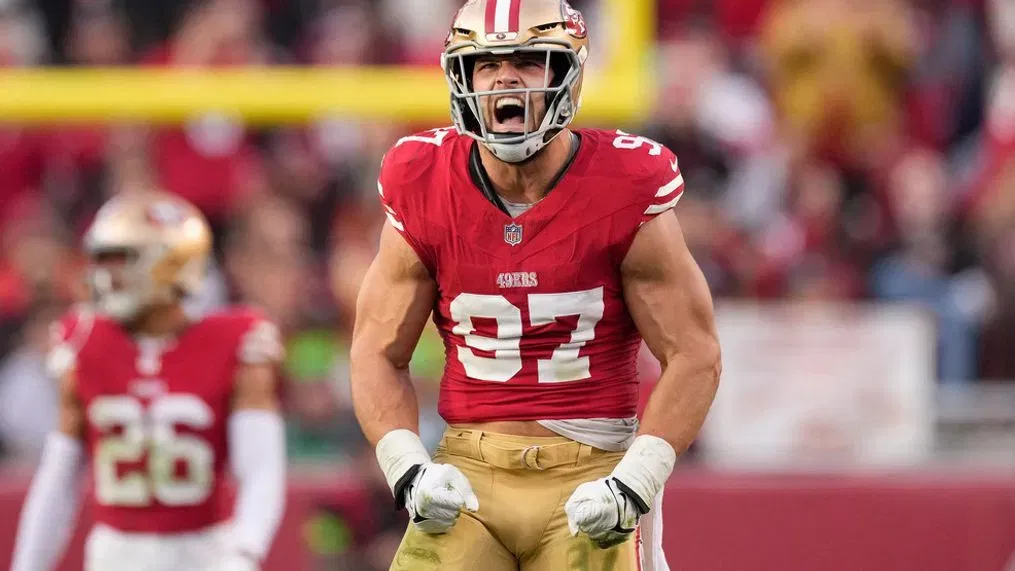San Francisco 49ers defensive end Nick Bosa has been fined by the NFL for wearing a MAGA (Make America Great Again) hat. The incident occurred during a post-game press conference, where Bosa donned the hat, which is widely recognized as a symbol of former President Donald Trump’s campaign. The league’s decision to fine Bosa has raised questions about the boundaries of personal expression and the role of political symbols in sports.
The NFL’s fine comes as part of its broader policy on maintaining a neutral environment that focuses on the sport rather than political affiliations. According to the league, players are expected to refrain from displaying politically charged symbols during official events. The fine imposed on Bosa has not been disclosed publicly, but it is believed to be a standard penalty for violating the NFL’s uniform and equipment regulations.
Bosa, known for his strong performances on the field, has previously expressed his political views openly, both on social media and in interviews. His support for Trump has been well-documented, making him a polarizing figure among NFL fans. The recent fine, however, marks the first time his political expressions have led to disciplinary action from the league.
The incident has sparked a flurry of reactions from both supporters and critics. Some argue that Bosa’s right to free speech should allow him to express his political beliefs without facing penalties. Others maintain that the NFL, as a private organization, has the right to enforce its policies to ensure that the focus remains on the sport rather than individual political statements.
In response to the fine, Bosa issued a statement expressing his disappointment with the NFL’s decision. He emphasized his belief in personal freedom and the importance of standing up for one’s beliefs. Bosa also noted that he did not intend to cause controversy but simply wanted to express his views.
The NFL Players Association has weighed in on the matter, highlighting the need for clear guidelines on what constitutes a violation of the league’s policies. The union has called for a discussion with the NFL to ensure that players’ rights to personal expression are balanced with the league’s objectives. The debate over Bosa’s fine is expected to be a topic of discussion in upcoming meetings.
Critics of the NFL’s decision argue that the league is setting a dangerous precedent by penalizing players for their political beliefs. They point out that other players have expressed political opinions without facing similar repercussions. This inconsistency, they argue, undermines the league’s stance on neutrality and fairness.
Supporters of the fine, however, argue that the NFL is within its rights to enforce its policies. They contend that the league must maintain a neutral space to avoid alienating fans with differing political views. By focusing on the sport, supporters believe the NFL can ensure a more inclusive environment for all fans.
The controversy surrounding Bosa’s fine has also reignited discussions about the role of athletes as public figures. Many believe that athletes have a platform and responsibility to use their influence to advocate for causes they believe in. Others argue that sports should remain apolitical, allowing fans to enjoy the game without the intrusion of political discourse.
As the debate continues, the NFL faces the challenge of balancing its policies with the diverse views of its players and fan base. The league’s handling of the situation will likely influence future decisions regarding player conduct and political expression. The outcome may also impact how other professional sports leagues address similar issues.
In the wake of the fine, Bosa’s teammates and coaches have shown varying degrees of support. Some have publicly backed Bosa, emphasizing the importance of personal expression, while others have remained neutral, focusing on the team’s performance on the field. The situation has not appeared to cause any visible rifts within the 49ers’ locker room.
The incident has also caught the attention of political commentators, who have weighed in on the broader implications of the fine. Some view it as a reflection of the ongoing cultural and political divisions within the United States. Others see it as an example of the challenges faced by organizations in navigating the intersection of sports and politics.
While Bosa’s fine has dominated headlines, it is not the first time the NFL has grappled with the issue of political expression. The league has previously faced criticism for its handling of player protests during the national anthem. These incidents highlight the ongoing tension between personal expression and organizational policies in professional sports.
As the season progresses, it remains to be seen how the NFL will address similar situations in the future. The league’s response to Bosa’s fine may set a precedent for handling politically charged expressions by players. The outcome could have lasting implications for the relationship between sports and politics.
For now, Bosa continues to focus on his performance with the 49ers, aiming to contribute to the team’s success on the field. Despite the controversy, his dedication to the sport remains unwavering. The incident serves as a reminder of the complex dynamics at play when personal beliefs intersect with professional responsibilities.
The fine has prompted discussions about the evolving role of sports in society. As athletes continue to navigate their roles as public figures, the line between personal and professional expression becomes increasingly blurred. The NFL’s handling of Bosa’s situation will be closely watched by fans, players, and stakeholders alike.
The controversy surrounding Nick Bosa’s fine highlights the ongoing conversation about freedom of expression in professional sports. As the debate unfolds, it underscores the need for clear guidelines and open dialogue between players, leagues, and fans. In a rapidly changing world, the intersection of sports and politics remains a complex and evolving landscape.
